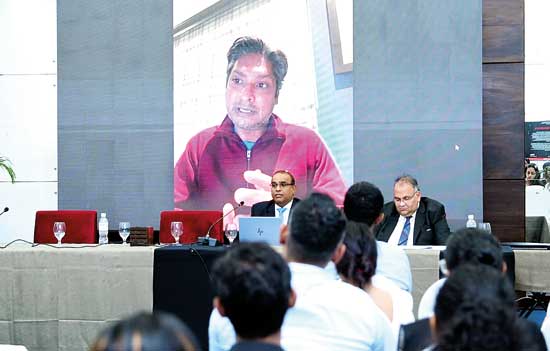It’s about preserving sanctity of the game we all love – Sanga
Former Sri Lanka cricket captain Kumar Sangakkara has highlighted the growing threat of corruption fueled by unchecked franchise cricket and the need for structural reform.
“The advent of the IPL and the proliferation of franchise leagues have provided incredible opportunities for players,” he observed, speaking virtually to the Sri Lanka Law College International Research Conference at BMICH on Friday.
“However, this has also created significant challenges. If we’re not careful, we could soon see players signing central contracts with franchises instead of their home boards, robbing fans of the joy of watching their best players represent their nations.”

Former national cricket skipper Kumar Sangakkara connected virtually from Britain and shared his expertise to the panel chaired by Sumathi Dharmawardena, PC
Sangakkara warned that this clash could lead to a domino effect, with the balance tilting heavily toward financial gains, jeopardising national pride.
Chaired by Sumathi Dharmawardena, PC, Additional Solicitor General and Independent Chair of the International Cricket Committee’s Anti-Corruption Unit (ACU), the session on sports drew attention to a phenomenon that could seriously erode the integrity of the game—the lure of big money and the clash between franchise ambitions and national team priorities.
Every franchise league, regardless of its stature, has had instances of corruption. Sangakkara, now domiciled in Britain, underscored this by referencing the match-fixing scandals of the late 1990s and early 2000s involving high-profile cricketers like Hansie Cronje and Mohammad Azharuddin.
“Match-fixing, as we knew it might not exist in the same form, but spot-fixing and other corrupt practices still plague the game,” he warned.
These issues are not confined to cricket. From basketball to snooker and tennis, the shadow of corruption looms large. Outgoing ICC Anti-Corruption Unit head Alex Marshall had previously identified poorly managed, minor leagues as a breeding ground for corruption—a sentiment Sangakkara echoed. “Unchecked franchise leads can pave the way for match-fixing, eroding the trust fans place in the sport.”
Sangakkara commended Sri Lanka’s progressive move to criminalise corruption in sports, a critical step in addressing the problem. However, he emphasised that legislation alone cannot fix this issue. Greater efforts are needed to raise awareness among players, educate them on spotting corrupt practices and build trust in reporting mechanisms.
“The ICC’s approach has evolved from simply catching and prosecuting players to addressing root causes,” Sangakkara noted.
He praised the work of officials like Dharmawardena and Marshall for their commitment to preventative measures and building trust. Dharmawardena was instrumental in enacting the Prevention of Offences Relating to Sports Act of 2019 (Act 24 of 2019) which criminalises sports-related offenses, including match-fixing, corruption, illegal betting, and illegal manipulation.
The match-fixing scandals of the late 1990s nearly destroyed cricket’s credibility. Yet, as Sangakkara reminded the audience, those dark days also served as a wake-up call. Today, proactive measures, such as confidential reporting mechanisms and player education programmes, are more critical than ever.
While enforcement is essential, Sangakkara argued that deterrence lies in prevention.
“Successful prosecutions may be newsworthy, but they come at a cost to the sport’s spirit,” he said.
“It is far better to prevent corruption at its source, safeguarding players and the game itself.”
As the sport embraces new formats and commercial ventures, the need for vigilance has never been greater. Sangakkara’s words are a rallying cry for stakeholders—players, boards, and fans alike—to ensure that cricket remains a game of trust, pride, and passion.
In the words of Sangakkara, “The fight against corruption is not just about punishing offenders; it’s about preserving the sanctity of the game we all love.”
He also stressed the importance of player managers in the present context, to monetise the sporting skills and player personalities. He urged authorities to regulate player managers to safeguard the integrity of both the sportsperson and the game they represent.
“Ensuring proper manager and agent registration with background checks is essential in safeguarding the integrity of both sportspersons and the game,” he explained.
“All professional sportspersons require managers as the opportunities to monitize that now exist are huge.”
“But at the same time we have seen players being tempted into nefarious activities by the actions of their own managers and agents,” he continued.
“In terms of corruption, managers and agents can play a very, very crucial part in safeguarding their players.”
Andrew Ephgrave, Senior ICC ACU Investigator, in his presentation spoke of ACU’s contribution to keeping the game free of corruption. Besides investigations and prosecution, they educate cricketers of the dangers of involvement in corruption. He used an example of Sri Lanka’s former fast-bowler Nuwan Zoysa, who served a six-year ban for violation of the anti-corruption code but later joined hands with the ACU to spread awareness among cricketers of the impact it had of his life and that of his family.


